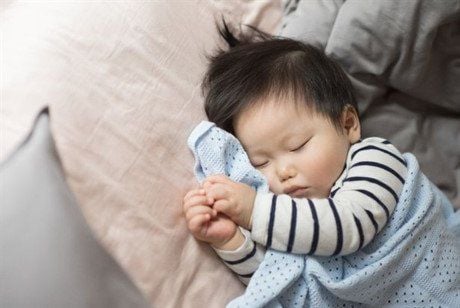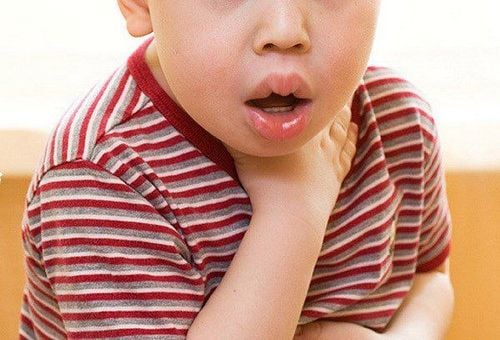This is an automatically translated article.
Children's sleep is not always peaceful. Babies often whine and startle in their sleep, and this makes new parents feel anxious. These are very normal symptoms, nothing to worry about. However, to recognize the abnormal condition of the child, parents should observe the child carefully.
1. Babies stop breathing while sleeping
There will be times when the baby suddenly breathes faster, then slows down and stops completely for 15 seconds before returning to normal breathing if parents carefully observe and listen to the baby's breathing while sleeping.
Infants between the ages of 1 and 6 months often have this phenomenon, if the child still has sleep apnea after 6 months of age, parents should consult a doctor about this problem.
Parents should not be too subjective with some children, this is a manifestation of sleep apnea syndrome (SIDS). For most babies, sleep apnea is not a cause for concern, but if your baby's forehead, tongue, fingernails, toenails, and lips turn blue, it's most likely a problem. absorb oxygen.
Some babies have sleep apnea. The child may stop breathing for up to 20 seconds. This phenomenon is normal and may be due to an immature brain stem with the function of regulating breathing. But if the pause lasts longer than 20 seconds, you should take your child to a specialist for an examination. In most cases, a child's irregular breathing is not a cause for concern.
If the baby's hands and feet are bluish, it may be because the baby is crying or coughing or cold. But if the baby's forehead, tongue, fingernails, and lips turn blue, it's likely that the child is having trouble absorbing oxygen. To help the baby breathe easily, the baby should be placed on his or her back to sleep. You can touch the baby or move the baby gently to see if the baby reacts if you are afraid that the baby will stop breathing.

Nên đặt bé nằm ngửa khi ngủ để bé dễ thở
Parents can sit next to or visit the baby often while the baby sleeps. When detecting that the child has stopped breathing, it is necessary to immediately start cardiopulmonary resuscitation (CPR), perform artificial respiration for the child, then urgently transfer the child to the nearest hospital.
2. Children snore and snort
When sleeping, your baby may snore or snort from time to time, this is normal.
The main reason why babies snore is due to a stuffy nose when they have a cold. If your baby has a cold, try using a humidifier to help him feel more comfortable and breathe easier. However, if your baby often snores, this is a problem that parents need to pay close attention to. The baby's airway is most likely blocked, if the child snores intermittently (with occasional interruptions), and is accompanied by gasping sounds.
This is considered a phenomenon of “sleep apnea” – a chronic disease. Try using a vaporizer or humidifier to help your baby breathe more comfortably when he has a cold. Frequent snoring can be a potential problem, parents need to be very careful.
The American Academy of Pediatrics recommends that you always discuss your child's snoring with your doctor, just to be on the safe side. The doctor can check your baby's problems and refer you to a specialist, such as an otolaryngologist or sleep specialist, to see if testing or treatment is needed. are not.

Nghẹt mũi có thể khiến trẻ ngáy hoặc khịt mũi khi ngủ
3. Children sweat a lot
Some babies sweat a lot while they sleep and as a result, when they wake up, the nape of their neck will be wet. This is because many babies take too long to fall asleep, so babies tend to sweat more throughout the night than adults and older children.Children sweat a lot while sleeping is a normal phenomenon, but if you sweat too much, parents should also be cautious. For example, a baby who sweats a lot while eating could be a sign of congenital heart disease or a number of different infections or sleep apnea. Excessive heat is a potential cause of sudden infant death syndrome (SIDS).
Put the baby to sleep in a warm but not too hot space. Children should be dressed comfortably, should not let them wear too many clothes when sleeping, keep the temperature in the room warm, should not wear a scarf for the baby to sleep. In fact, if you feel too hot, children will feel the same way. Therefore, if it's cool in the house and your child is still sweating in light clothing, you should consult your doctor about this.
4. Children startle, cry when sleeping
At night, babies often startle and cry while sleeping. This makes mothers worry, whether the baby's startling in the middle of the night will affect the baby's health. Usually, babies will often wake up several times during the night to drink milk when the baby is under 6 months old. This is a completely normal problem, so you don't need to worry too much.

Trẻ giật mình quấy khóc đêm là vấn đề hoàn toàn bình thường
Many babies are often awake and fussy most of the night during the first 2 months after birth. Babies will sleep for a relatively longer time when they reach 3 months old, with healthy babies, they usually just need to be hugged and comforted, they will quickly go back to sleep.
By the time the baby is about to walk, the baby's fussiness at night may be because the baby is in the teething phase or learning to crawl, so it is easy to be overactive during the day, making it difficult for the baby to sleep at night. , often fussy.
5. Children shake their heads, shake their bodies while sleeping
Like body shaking, head shaking is a common behavior some babies use to comfort themselves. Babies may shake their heads to distract themselves from pain - for example, if they are teething or have an ear infection. Shaking of the head usually begins after a baby is 6 months old and can last for several months or even years, but most often occurs in children as young as 3 or 4 years old. This is a normal phenomenon, parents shouldn't worry too much.
Parents need to get to the core of the problem. If your child is aware that you're trying to get him to stop doing this, he'll still act as if that kind of defiance and intentionality or attitude will make him more interested in the behavior.
Move the baby's crib or bed away from the walls if the baby's actions make a sound or cause strong vibrations. In addition, be sure to tighten the screws of the crib and bed regularly, to avoid loosening due to vibration or you can spread the mattress on the floor when the baby is asleep.
You can comfort your baby before going to sleep with a warm bath, read a story or rub his back to help him fall asleep without having to rock. Take your child to the doctor if he or she starts shaking after 18 months, or does it more than just at bedtime, or if the behavior persists beyond 4 years of age.
In some cases, a baby's head shaking can be a sign of a developmental delay.

Cha mẹ có thể vỗ về và đọc truyện để trẻ dễ dàng đi vào giấc ngủ
6. Children grind their teeth
A lot of toddlers have a habit of “crushing” their teeth during sleep. This phenomenon can happen to young children of any age, but is most common in infants who have just started teething and children who are in the period of permanent teeth.
Uncomfortable feeling when a new tooth comes in, or the baby has pain (earache, toothache ..), difficulty breathing (stuffy nose ...) are potential causes for children to sleep or grind their teeth.
You may feel shivers when you hear the sound of "crushing teeth" coming from your mouth, however, it does not hurt or erode the enamel of your baby's teeth. In case of unexpected cases, parents should take the child to see the dentist for a checkup (for the first time the baby has a dental check-up when he is 1 year old).
7. Children convulsions, restlessness while sleeping
Some children when sleeping or drowsy have convulsions, restlessness. Often these movements will last a few seconds and occur several times per minute. This phenomenon can occur in any part, within minutes or hours.
This movement does not hurt the baby but it affects the baby's sleep. Sometimes, this condition can be a sign of iron or folic acid deficiency, so you should consult your doctor about the problem. In addition, restless legs syndrome may occur in some children with accompanying signs such as discomfort in the legs. When suspecting that a child has this syndrome, parents should take the child to the doctor to help the child sleep well.
Another issue that parents need to pay attention to in order for their children to get a good night's sleep is the need to change their nutrition and living habits. In addition to the diet, children need to be supplemented with necessary micronutrients: Zinc, selenium, chromium, vitamins B1 and B6, ginger, acerola fruit extract (vitamin C),... Strengthening resistance to reduce minor illnesses The pediatric department at Vinmec International General Hospital is the address for receiving and examining diseases that infants and young children are susceptible to: viral fever, bacterial fever, otitis media, pneumonia in children, .... With modern equipment, sterile space, minimizing the impact as well as the risk of disease spread. Along with that is the dedication from the doctors with professional experience with pediatric patients, making the examination no longer a concern of the parents.
Article referenced source: babycenter.com













